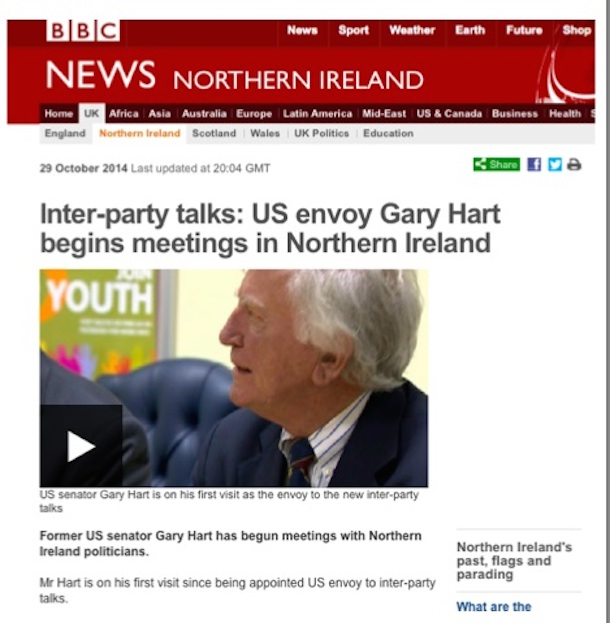30 October 2014
Stormont talks – US and civic society’s interventions need to be urgently built upon

SENATOR GARY HART’S arrival in the North as an envoy representing the US administration to encourage and support the current talks is an important development.
That and the phone conversations between US Vice-President Joe Biden and Martin McGuinness (and also Peter Robinson on Wednesday) are clear indications that the Americans are focused on the serious difficulties gripping the political process.
This type of political and diplomatic influence is essential to get a credible process introduced to these talks.
The mutually-reinforcing negative dynamics arising from British mismanagement and the unionist anti-agreement axis are a block to progress. Both directly contribute to the subversion of the Good Friday Agreement framework. It needs to be consolidated, not undermined.
Sustained US diplomatic pressure can be the catalyst to help restore political stability and ensure that a viable talks roadmap emerges towards achieving a ‘Plan A Plus’ outcome.
That should be an important impetus for the Irish Government to exercise its full responsibility as a co-guarantor for the implementation of all elements of the Good Friday, Weston Park, St Andrews and Hillsborough Castle Agreements.
Another recent positive development is the emergence of the ‘Make It Work’ initiative promoted by local leaders from within civic society.
The message from ‘Make It Work’ makes an important appeal to all political parties to harness the political opportunity that is available.
Their initiative is a much-needed mobilisation of civic society’s ‘soft power’ and goodwill at this time.
The Civic Forum proposed by the Good Friday Agreement and which political unionism undermined was, and is, a vehicle to enable civic society to play a strategic and structured role within the political process.
Establishing a new Civic Forum should be part of the talks agenda.
The marginalisation of that positive influence from the political process after the Good Friday Agreement referendum has held back the continued transformation of Northern society.
The blocking and frustration of democratic change has encouraged negative politics and energised sectarian extremism.
That self-perpetuating cycle will only be reversed through the primacy of pro-agreement politics and making power-sharing and partnership work.
The business, trade union, community, cultural, and academic sectors, as well as wider civic society, now have a crucial role to play. The intervention by the US administration should strengthen their resolve.
Pro-agreement and democratic politics need to be empowered, and the anti-agreement axis disabled. The British Government must be brought on to that agenda. Both the US and Irish governments have a key role in bringing this about.
The current viability of partnership government and power-sharing is under threat, and with that any potential for economic restructuring, growth and competitiveness.
Political and economic progress in the North hinges upon the success of these talks. A successful outcome will be significantly dependent on the momentum of civic society’s ‘soft power’ and the intensity of the US and Irish governments’ engagement.
Follow us on Facebook
An Phoblacht on Twitter
Uncomfortable Conversations

An initiative for dialogue
for reconciliation
— — — — — — —
Contributions from key figures in the churches, academia and wider civic society as well as senior republican figures





